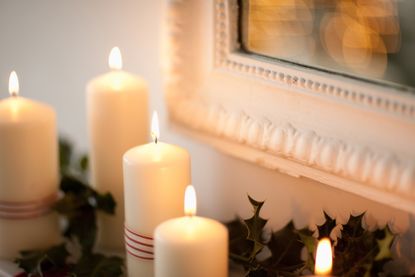The hazardous ways to heat and light your home you should avoid
As households look for cheaper ways to use electricity in the home amid energy costs rising, an insurer warns it is encouraging hazardous choices. We've asked the experts how you can stay safe and what to avoid


Households are trying to heat and light their homes at a lower cost but there are concerns over hazardous choices, as research reveals one in seven people might use candles to light their home to keep energy bills down, posing a fire threat.
The research, by Zurich UK, has found fires caused by candles can leave households with average repair bills of £18,000.
The insurer's research also found Liverpool, Manchester, Nottingham, Glasgow and Sheffield are amongst the cities where people are most likely to light candles in their home.
Paul Redington, property claims expert at Zurich UK said: “The energy crisis is forcing people to make tough – and potentially more hazardous – choices over how they heat and light their home.
There is now concern that accidental blazes could become more commonplace this winter as households use candles to keep energy bills down or cope with potential blackouts.”
Here we explain the hazardous ways to heat and light your home to avoid and the fire-risk appliances you shouldn’t leave running unattended overnight.
SAFETY TIPS WHEN USING A CANDLE TO LIGHT YOUR HOME
A small candle might seem harmless, but if it causes a fire in your home it could lead to thousands of pounds in damages.
Look After My Bills Newsletter
Get the best money-saving tips, tricks and deals sent straight to your inbox every week. Make sense of your money in partnership with The Money Edit.
It’s important to use candles safely. Here are some safety tips that Zurich UK suggest households follow:
- If you leave the room, put the candle out. Never leave it on when going out of sight.
- Don’t blow a candle out yourself, do it with a spoon to avoid sparks flying.
- Keep candles away from flammable objects for example bedding, furniture, books and bedding.
- Put a fire alarm in your home and test it weekly.
- When finding a place to put candles, make sure it’s a stable surface, away from children and pets.
- Don’t leave lit candles near an open window and don’t move it around
- Don’t burn multiple candles next to each other because this could cause them to flare.
- In the event of a fire, you should get out, stay out and call 999.
HOW TO USE YOUR ELECTRIC BLANKET SAFELY
The London Fire Brigade are aware that electric blankets are a popular option to keep warm in the winter and cost effective, but they warn households should use them with care. Here’s how:
Electric blankets are an increasingly popular option to keep warm this winter, cutting back on the cost of putting the heating on.
It’s wise to know how to buy and use an electric blanket safely:
- Regularly check the blanket to make sure there is no wear and tear. If there is, it needs to be replaced
- The blanket would also need to be replaced if it makes a buzzing sound when turned off
- Check to see if the blanket has a Kitemark. If it does, it means the blanket has been tested by experts and is more safe to use
- To prevent damage of the wires in the electric blanket, you can store it flat or roll it up
- Always read the instructions manual to get it up and running the correct way
- Don’t use a hot water bottle when using your electric blanket
- Never switch the electric blanket on if it is wet
RISKS OF USING YOUR FIREPLACE FOR THE FIRST TIME
If you plan on using your fireplace, it’s essential you know how to set it up properly and the risks that come with using it.
The National Chimney Sweep Guild advises that before beginning to use your fireplace you get your chimney cleaned professionally, checking for animal nests and any deterioration - ensuring it is safe to use. You should get your chimney cleaned at least once a year.
Also check the surroundings of the fireplace and remove any flammable items for example clothing, books and home decor.
According to the National Chimney Sweep Guild, here’s how you can safely start a fire in a fireplace:
- Put 2 medium pieces of firewood on the metal grate, with around a 6 inch gap
- Fill the gap with crumpled newspaper (tinder) and cover the tinder with kindling
- Then place two more firewood pieces on top of the other logs in the fireplace, but be sure to leave room for ventilation
- Make sure the fireplace vent is fully open
- Now it’s time to light the fire by twisting a single piece of newspaper, lighting it and holding it upwards towards the chimney (high up in the fireplace). Then light the kindling
- Once the fire is alight, you can keep adding firewood when needed to ensure the flame stays visible
It’s important to always put the fire out if you leave the room for safety.
When you have your heating on or find other ways to heat your home, for example by using the fireplace, they burn gases, wood, oil and coal which produces a poisonous gas called carbon monoxide.
Which? recommends every household should have a carbon monoxide alarm. It will sound a loud alarm if it detects that there is enough carbon monoxide in the air to harm you.
The big danger is you can’t see it or smell it, so you could leave an appliance on and not know that it is releasing carbon monoxide.
If the alarm does ever go off, you need to open all doors and windows in your home, turn off all fuel burning appliances and seek medical advice as soon as possible.
AVOID OVERLOADING PLUG SOCKETS
It’s easy to turn your electrical appliances on and forget about the risks that come with it, like overloading plug sockets. Here’s how to prevent it according to Electrical Safety First.
Check the rating of your extension lead before plugging in appliances. The most common rating stands at 13A, but also can be as low as 10A or even less.
So when plugging appliances in, you should make sure it doesn’t exceed the maximum rating of the extension leads, as it could cause the plug to overheat and start a fire.
You can use the Electrical Safety First overload calculator to ensure you are not exceeding the rating of your plug.
Electrical Safety First also recommends never plugging one extension lead into another.
THE RISK OF LEAVING ELECTRIC APPLIANCES ON OVERNIGHT
If you’re substituting your heating for an electric blanket or a portable electric heater, it can be unsafe to leave appliances on overnight.
Insurance companies and energy experts tell you the risks and how to stay safe when using appliances overnight.
Electric heaters London Fire Brigade is warning people using electric heaters. It dealt with a case in April where a woman sadly died because she had her heater too close to her and it got caught under her recliner chair. London Fire Brigade ask people to keep electric heaters away from furniture and bedding, make sure the heater is in good condition/ working well and never repair or service it yourself.
Electric Blankets Martyn Allen, Technical Director of Electrical Safety First says: “we would remind people to follow some simple guidelines if they decide to use electric blankets, as the results of using them incorrectly can end up causing a fire.
“When it comes to electric blankets, it is important that people carry out a visual check of their blanket before use to look for burn marks or damage and to never use it with a hot water bottle or when it’s folded or severely creased.”
Related articles
- Is a dishwasher cheaper than hand-washing?
- Is a fan heater cheaper than an oil heater?
- Is a wood burning stove cheaper than central heating?
- How to lower your boilers flow temperature and save £112 on your bills
- Is it cheaper to leave your heating on all day?
- How much does it cost to run a kettle?
- Is electricity cheaper at night?
- Will putting cling film on window lower my energy bills?

Vaishali graduated in journalism from Leeds University. She has gained experience writing local stories around Leeds and Leicester, which includes writing for a university publication and Leicester Mercury.
She has also done some marketing and copywriting for businesses.
When she is not writing about personal finance, Vaishali likes to travel and she's a foodie.
-
 Three energy firms pay £8m in switching compensation - has your provider paid out?
Three energy firms pay £8m in switching compensation - has your provider paid out?More than 100,000 customers have received compensation after changing providers, but is now a good time to switch energy suppliers?
By Tom Higgins Published
-
 Save £300 on your supermarket shop with cashback accounts
Save £300 on your supermarket shop with cashback accountsBanks, credit card companies and cashback sites are all offering cashback on your supermarket shop, but can you use them all to max out your savings?
By Vaishali Varu Published
-
 Three energy firms pay £8m in switching compensation - has your provider paid out?
Three energy firms pay £8m in switching compensation - has your provider paid out?More than 100,000 customers have received compensation after changing providers, but is now a good time to switch energy suppliers?
By Tom Higgins Published
-
 HMRC tax credit renewal packs: act quickly to avoid losing benefit payments
HMRC tax credit renewal packs: act quickly to avoid losing benefit paymentsHouseholds receiving tax credits will be asked to confirm their details to ensure they continue to receive their entitlement. Here’s everything you need to know to make sure you don’t miss out on up to £3,480 a year
By Tom Higgins Published
-
 Mobile provider rewards: how to earn up to £700
Mobile provider rewards: how to earn up to £700Your phone could be the key to unlocking hundreds of pounds worth of discounts and freebies that you don’t even know about. We reveal which mobile providers offer the best rewards
By Vaishali Varu Published
-
 How much do cooking appliances cost to run?
How much do cooking appliances cost to run?Energy-saving cooking tips from the Energy Saving Trust
By Katie Binns Published
-
 Virgin Media leaves thousands without broadband: are customers entitled to compensation?
Virgin Media leaves thousands without broadband: are customers entitled to compensation?Tens of thousands of Virgin Media customers were hit by broadband outages yesterday. We explain your rights if your broadband goes down
By Katie Binns Published
-
 Broadband switching service delayed - how it will eventually work and why it’s crucial to switch
Broadband switching service delayed - how it will eventually work and why it’s crucial to switchA broadband switching service designed to make it easier to change to a cheaper or faster deal has been delayed. We explain how you can still avoid huge increases to your monthly internet bill
By Katie Binns Published
-
 Heat pumps: why you can claim a £5,000 government grant for longer
Heat pumps: why you can claim a £5,000 government grant for longerWhy you now have more time to apply for a government grant towards getting a heat pump in your home
By Sue Hayward Published
-
 British Gas cuts energy bills by £15 for prepayment meter customers from April
British Gas cuts energy bills by £15 for prepayment meter customers from AprilOne million British Gas customers on energy prepayment meters will save around £15 as British Gas cuts its penalty three months early
By Sue Hayward Published